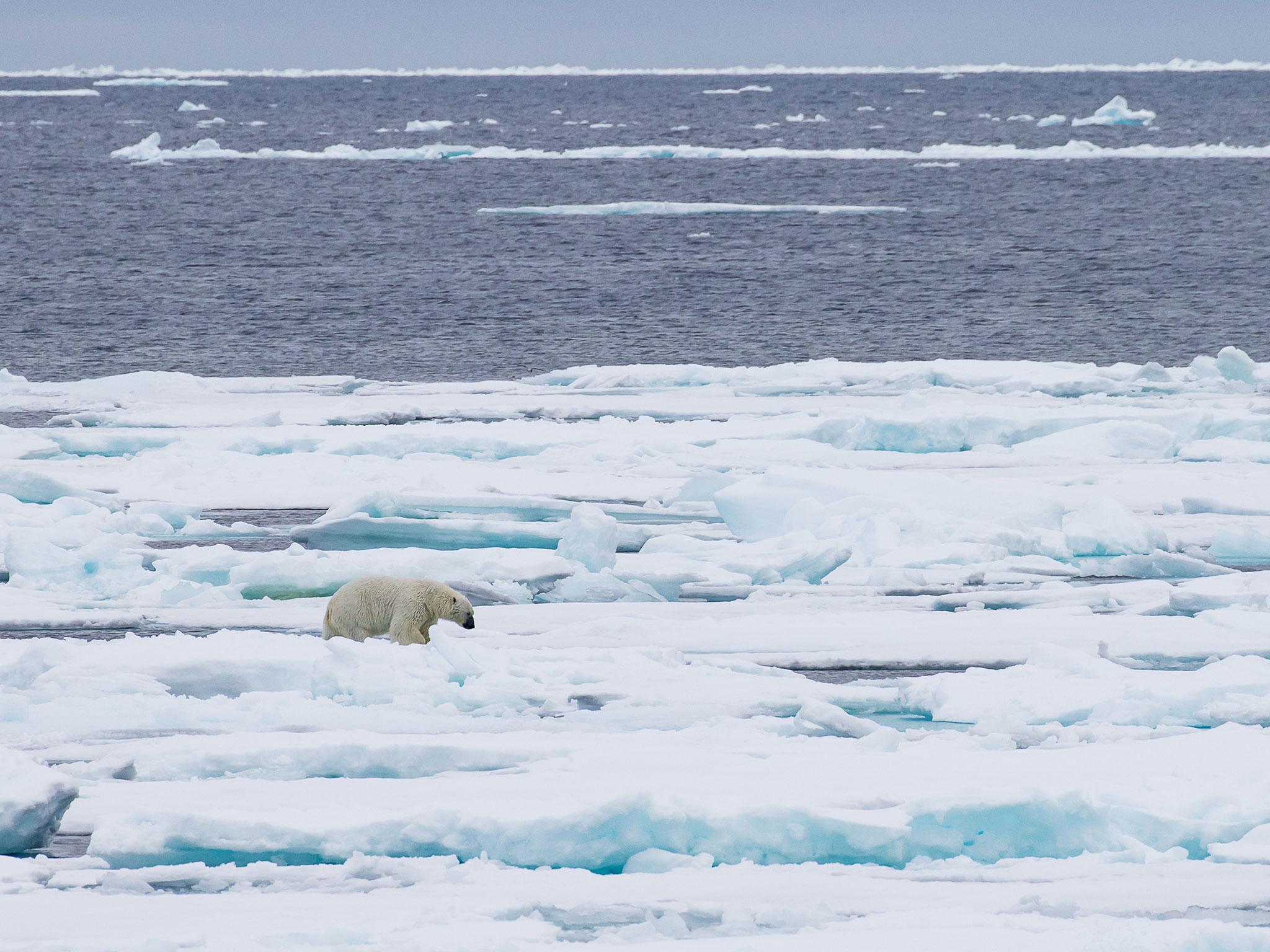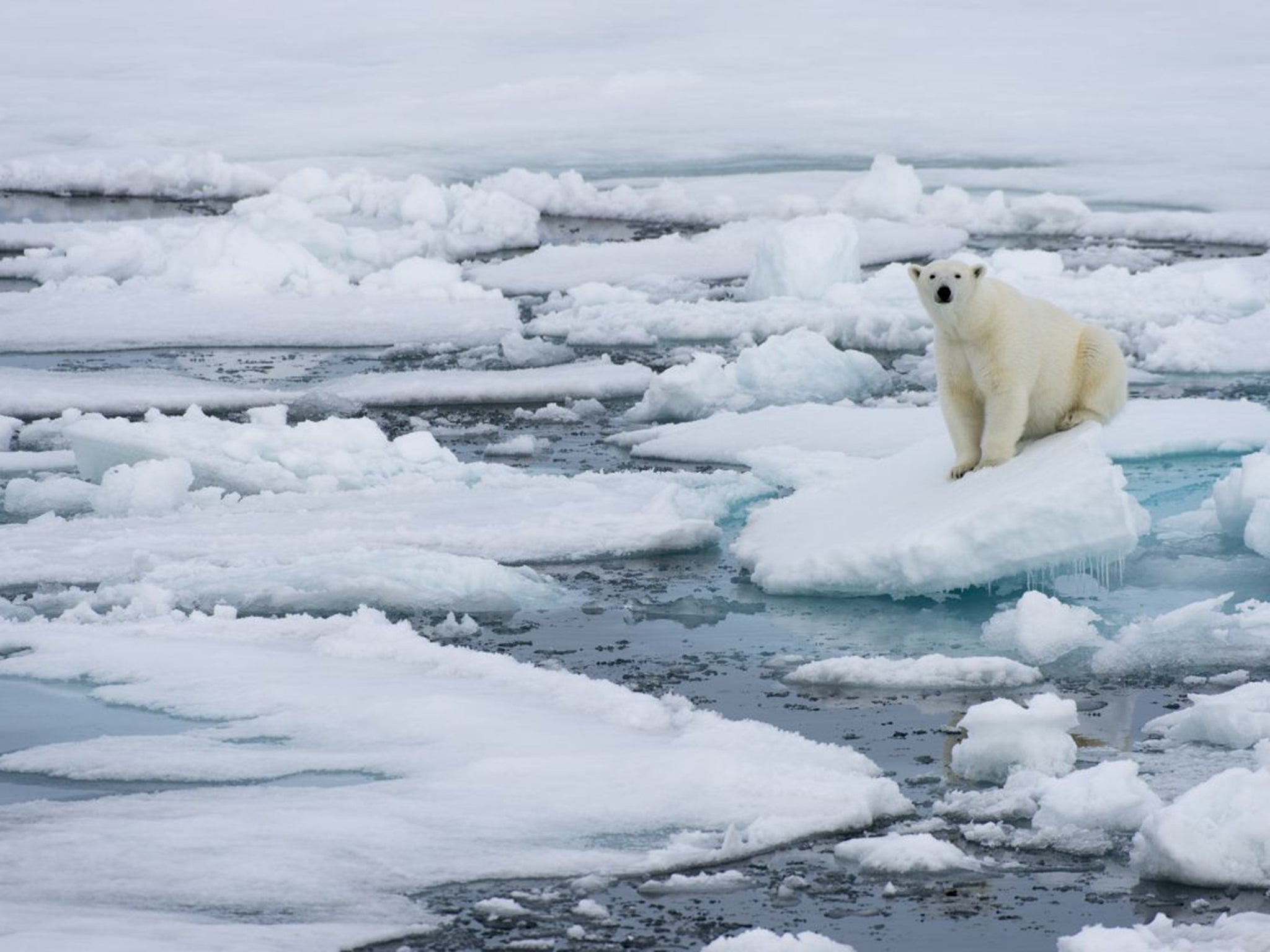Arctic could become ice-free for first time in more than 100,000 years, claims leading scientist
Professor Peter Wadhams of Cambridge University predicts we could see ‘an area of less than one million square kilometres for September of this year’

Your support helps us to tell the story
From reproductive rights to climate change to Big Tech, The Independent is on the ground when the story is developing. Whether it's investigating the financials of Elon Musk's pro-Trump PAC or producing our latest documentary, 'The A Word', which shines a light on the American women fighting for reproductive rights, we know how important it is to parse out the facts from the messaging.
At such a critical moment in US history, we need reporters on the ground. Your donation allows us to keep sending journalists to speak to both sides of the story.
The Independent is trusted by Americans across the entire political spectrum. And unlike many other quality news outlets, we choose not to lock Americans out of our reporting and analysis with paywalls. We believe quality journalism should be available to everyone, paid for by those who can afford it.
Your support makes all the difference.The Arctic is on track to be free of sea ice this year or next for the first time in more than 100,000 years, a leading scientist has claimed.
Provisional satellite data produced by the US National Snow & Ice Data Centre shows there were just over 11.1 million square kilometres of sea ice on 1 June this year, compared to the average for the last 30 years of nearly 12.7 million square kilometres.
This difference – more than 1.5 million square kilometres – is about the same size as about six United Kingdoms.
Professor Peter Wadhams, head of the Polar Ocean Physics Group at Cambridge University, told The Independent that the latest figures largely bore out a controversial prediction he made four years ago.
“My prediction remains that the Arctic ice may well disappear, that is, have an area of less than one million square kilometres for September of this year,” he said.
“Even if the ice doesn’t completely disappear, it is very likely that this will be a record low year. I’m convinced it will be less than 3.4 million square kilometres [the current record low].
“I think there’s a reasonable chance it could get down to a million this year and if it doesn’t do it this year, it will do it next year.
“Ice free means the central part of the Arctic and the North Pole is ice free.”
Most of the remaining ice within the Arctic Circle would be trapped among the myriad of islands along Canada’s north coast.
The last time the Arctic was clear of ice is believed to be about 100,000 to 120,000 years ago.
The rapid warming of the polar region has been linked with extreme weather events such as “bomb cyclones”, flooding in the UK and out-of-season tornadoes in the United States.
And the sea ice off the north coast of Russia, which normally insulates the water below to keep it cool, is no longer present for much of the year, allowing the sea to get significantly warmer than before.
Scientists have monitored greenhouse gas methane – once frozen on the sea bed – bubbling up to the surface at an alarming rate.
According to one study published in the journal Nature by Professor Wadhams and others, this could produce an average rise in global temperature of 0.6 degrees Celsius in just five years.
“That would be a very, very serious upward jerk to global warming,” Professor Wadhams said, saying the prospect was “frightening”.
Less sea ice also means the surface of the Earth is darker, so it absorbs more of the sun’s energy.
“When the sea ice retreats, it changes the whole situation. People are right to be concerned about the sea ice retreat and disappearance mainly because of all these other feedbacks,” Professor Wadhams added.
Sea ice is usually at its lowest in September and starts to build again when the winter sets in.
Dr Peter Gleick, a leading climatologist, said he had “no idea” if Professor Wadhams’ prediction was correct.
And he added: “If it's wrong, this kind of projection leads to climate sceptics and deniers to criticize the entire community.”
However Dr Gleick said Professor Wadhams was right to sound a warning about the rising temperatures in the region, saying it was “extraordinarily disturbing even in a world of disturbing news about accelerating climate change”.
“An ice-free - and even an ice-reduced - Arctic is leading to global impacts on weather and ecosystems, and most importantly, that the changes in the Arctic presage dramatic fundamental changes in climate throughout the globe,” he said.
“We're on a runaway train, scientists are blowing the whistle, but politicians are still shovelling coal into the engine.”

Professor Jennifer Francis, of Rutgers University in the US, who has studied the effect of the Arctic on the weather in the rest of the northern hemisphere, was also sceptical about Professor Wadhams' prediction, saying it was “highly unlikely” to come true this year.
She said she thought this would not happen until sometime between 2030 and 2050.
But Professor Francis stressed: “We are definitely looking at a very unusual situation up in the Arctic.
“The ice is very low and there have been record-breaking low amounts of ice in January, February, March, April and now May, so this is very worrisome.
“I think we are going to see perhaps a new record [in September], that’s very possible.”
Join our commenting forum
Join thought-provoking conversations, follow other Independent readers and see their replies
Comments